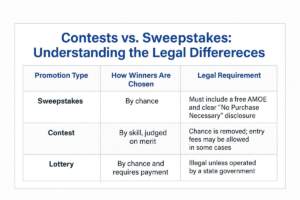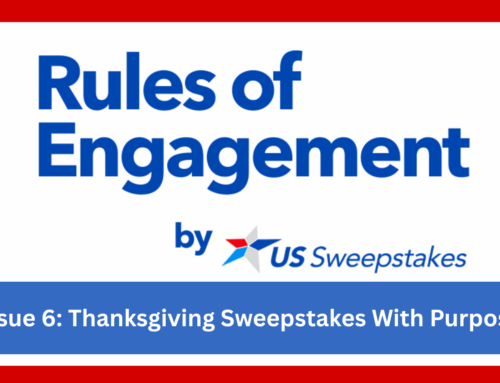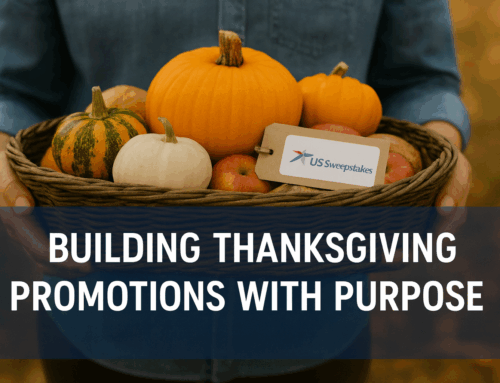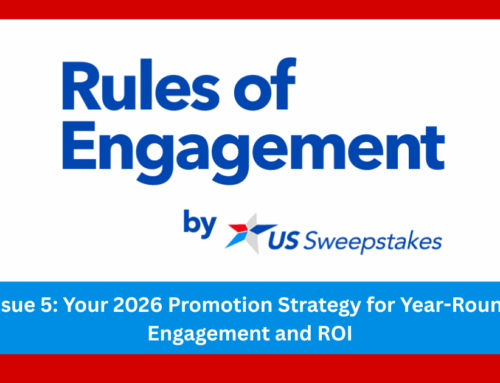 Why “No Purchase Necessary” Defines Sweepstakes Legality
Why “No Purchase Necessary” Defines Sweepstakes Legality
Every legitimate sweepstakes begins with the same rule: entry must be free. The phrase “No Purchase Necessary” isn’t just a disclosure – it’s what separates a lawful sweepstakes from an illegal lottery.
This requirement ensures equal access and protects both consumers and brands. Understanding its legal foundation helps you design promotions that are transparent, compliant, and built to last.
The Legal Definition of a Sweepstakes
A sweepstakes is a promotional game of chance in which winners are selected randomly and receive a prize.
Under U.S. law, a sweepstakes is only legal if participation is free and open to everyone.
If an entrant must pay, make a purchase, or provide something of measurable value to participate, the promotion becomes an illegal lottery.
The formula remains simple:
Prize + Chance — Consideration = Legal Sweepstakes
Understanding “Consideration”
“Consideration” means anything a participant provides in exchange for the chance to win – and it’s the factor that determines legality. It can be financial, digital, or effort-based.
Examples of monetary consideration:
- Requiring a purchase or paid entry fee
- Linking entries to a subscription or paid service
- Offering automatic entries with product purchases
Examples of non-monetary consideration:
- Requiring lengthy or complex entry tasks (videos, essays, surveys)
- Asking users to attend presentations or visit multiple locations
- Any activity that benefits the organizer or takes substantial effort
Even non-monetary actions can qualify as consideration under certain state laws – which is why clear rules and a valid Alternate Method of Entry (AMOE) are essential to maintain compliance and ensure that everyone has a free, fair way to participate.
US Sweepstakes Insight
Don’t overlook effort-based consideration. Even if your sweepstakes doesn’t involve a payment, time-consuming or complex entry methods can trigger compliance risk. Keep participation simple — and always offer a free Alternate Method of Entry (AMOE).
Who Enforces “No Purchase Necessary” Laws
These laws are designed to protect consumers and are enforced at both federal and state levels. Key agencies include:
Federal Trade Commission (FTC) – Regulates advertising and consumer protection
Federal Communications Commission (FCC) – Oversees promotions across broadcast and digital media
United States Postal Service (USPS) – Monitors sweepstakes conducted by mail
State Attorneys General – Enforce state-specific lottery and sweepstakes laws
This multi-agency oversight ensures that all sweepstakes remain fair, accessible, and free of deceptive requirements.
The Role of AMOE (Alternate Method of Entry)
If a promotion includes purchase-related entries, it must also provide a free Alternate Method of Entry (AMOE). This maintains equal access and ensures compliance under the equal dignity rule.
Common AMOE formats include:
- Mail-in entries (postcards or written forms)
- Online entries (free web forms with no purchase required)
- In-person entries (drop boxes or registration kiosks)
To remain compliant, all entry methods must:
- Offer the same odds of winning
- Remain open for the same time period
- Be disclosed clearly in the Official Rules
US Sweepstakes Insight
Equal access isn’t optional — it’s the cornerstone of No Purchase Necessary compliance. Your AMOE must be just as easy and visible as your purchase-based entry.
Avoiding an Illegal Lottery
A sweepstakes becomes an illegal lottery when all three of the following elements are present:
- Prize – Something of value is awarded
- Chance – Winners are chosen randomly
- Consideration – Entry requires payment or significant effort
Removing consideration (and clearly disclosing a free AMOE) keeps your sweepstakes on the right side of the law.
Contests, Sweepstakes, and Lotteries: Understanding the Difference
The difference between these promotion types lies in skill, chance, and payment.

Sweepstakes are games of chance that must include a free Alternate Method of Entry, contests are based on skill, and lotteries – requiring payment and chance – are only legal when state-run.
State-Specific Sweepstakes Laws
Federal law defines the foundation of sweepstakes regulation, but many states add their own requirements:
- Florida, New York, and Rhode Island – Require registration and bonding for prizes exceeding specific thresholds
- Colorado, Maryland, Nebraska, North Dakota, and Vermont – Restrict or prohibit entry fees, even for contests
For national campaigns, that mix of regulations means expert oversight is crucial – which is why brands rely on US Sweepstakes for compliance and administration.
Best Practices for “No Purchase Necessary” Compliance
To run a legally compliant sweepstakes:
- Include a clear “No Purchase Necessary” statement in all materials
- Publish complete Official Rules
- Offer a valid and easy-to-use AMOE
- Keep all entry methods open for the same duration
- Register and bond where required
- Protect entrant privacy under CCPA and GDPR
- Issue IRS Form 1099-MISC for prizes valued at $600 or more
Why Compliance Builds Brand Trust
“No Purchase Necessary” isn’t just about legality – it’s about fairness, transparency, and consumer confidence.
A compliant sweepstakes:
- Demonstrates integrity
- Ensures equal opportunity for all entrants
- Prevents penalties or disputes
- Strengthens your brand’s credibility and reputation
Ensure Compliance With the Experts at US Sweepstakes
Running a sweepstakes requires more than creativity – it demands precision, transparency, and full legal compliance.
At US Sweepstakes, we manage every step of the process to ensure your promotion meets federal and state requirements.
Our team specializes in:
- Drafting and reviewing Official Rules
- Setting up and managing Alternate Methods of Entry (AMOE)
- Handling state registration and bonding
- Conducting winner verification and prize fulfillment
With our comprehensive sweepstakes administration and legal expertise, you can launch confident that your promotion is fully compliant, professionally managed, and built to protect your brand.
Contact US Sweepstakes to discuss your next campaign and ensure your sweepstakes meets every No Purchase Necessary standard.
FAQ: No Purchase Necessary Laws & Sweepstakes Compliance
What does “No Purchase Necessary” mean under U.S. law?
Under federal and state law, a sweepstakes must allow free entry for all eligible participants. Requiring a payment, purchase, or substantial effort to enter introduces “consideration,” which transforms a sweepstakes into an illegal lottery.
What is an AMOE and why is it required?
An Alternate Method of Entry (AMOE) provides a no-cost way to participate, ensuring every entrant has equal access and identical odds of winning. A compliant AMOE is a cornerstone of lawful sweepstakes design under U.S. promotion law.
Do all states follow the same No Purchase Necessary standards?
No. While the “No Purchase Necessary” principle applies nationwide, several states—such as Florida, New York, and Rhode Island—require registration and bonding for larger prize pools. Partnering with a licensed sweepstakes administrator helps ensure compliance across all jurisdictions.



